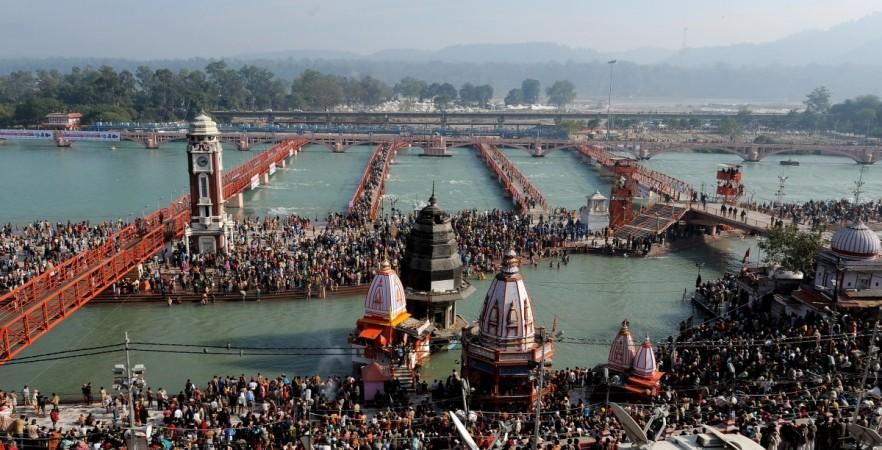
UNESCO has recognised Kumbh Mela, one of the largest religious gatherings on the planet, as an "intangible cultural heritage of humanity," which helps demonstrate the diversity of the heritage.
During the 12th session in Jeju, South Korea, UNESCO's Intergovernmental Committee for the Safeguarding of Intangible Cultural Heritage inscribed India's biggest religious gathering on the "Representative List of the Intangible Cultural Heritage of Humanity."
The committee inscribed 33 elements on the list from countries, including India, Iran, Bangladesh, Botswana, Colombia, Venezuela, Mongolia, Morocco, Turkey and the United Arab Emirates.
"Kumbh Mela just inscribed on the Representative List of the Intangible Cultural Heritage of Humanity. Congratulations, #India #IntangibleHeritage #12COM," UNESCO tweeted on December 7.
Kumbh Mela is a mass Hindu pilgrimage in which Hindus gather to take bathe in the holy water. This takes place in four places – Allahabad, Haridwar, Ujjain and Nasik – and lakhs of devotees from across the world travel to attend the mela. It takes places every three years and switches between these four locations.
After the recognition, Union Culture Minister Mahesh Sharma tweeted saying that it is a proud moment for Indians.
"A very proud moment for us as sacred #KumbhMela is just inscribed as the Intangible Cultural Heritage of Humanity by @UNESCO," he tweeted, adding, "Kumbh Mela is considered to be the largest peaceful congregation of pilgrims on earth, attended by millions irrespective of caste, creed or gender."
Here is the complete list of 33 newly inscribed elements:
- Saudi Arabia - Al-Qatt Al-Asiri, female traditional interior wall decoration in Asir, Saudi Arabia
- Armenia - Kochari, traditional group dance
- Azerbaijan - Dolma making and sharing tradition, a marker of cultural identity
- Bangladesh - Traditional art of Shital Pati weaving of Sylhet
- Bolivia (Plurinational State of) - Ritual journeys in La Paz during Alasita
- Bosnia and Herzegovina - Konjic woodcarving
- Bulgaria; The former Yugoslav Republic of Macedonia; Republic of Moldova; Romania - Cultural practices associated to the 1st of March
- Côte d'Ivoire - Zaouli, popular music and dance of the Guro communities in Côte d'Ivoire
- Cuba – Punto
- Kazakhstan - Kazakh traditional Assyk games
- Portugal - Craftmanship of Estremoz clay figures
- Germany - Organ craftsmanship and music
- Greece – Rebetiko
- India - Kumbh Mela
- Indonesia - Pinisi, art of boatbuilding in South Sulawesi
- Iran (Islamic Republic of) - Chogān, a horse-riding game accompanied by music and storytelling
- Iran (Islamic Republic of); Azerbaijan - Art of crafting and playing with Kamantcheh/Kamancha, a bowed string musical instrument
- Ireland - Uilleann piping
- Italy - Art of Neapolitan 'Pizzaiuolo'
- Kyrgyzstan - Kok boru, traditional horse game
- Malawi - Nsima, culinary tradition of Malawi
- Mauritius - Sega tambour of Rodrigues Island
- Netherlands - Craft of the miller operating windmills and watermills
- Panama - Artisanal processes and plant fibers techniques for talcos, crinejas and pintas weaving of the pinta'o hat
- Peru - Traditional system of Corongo's water judges
- Serbia - Kolo, traditional folk dance
- Slovakia - Multipart singing of Horehronie
- Slovenia - Door-to-door rounds of Kurenti
- Switzerland - Basel Carnival
- The former Yugoslav Republic of Macedonia; Turkey - Spring celebration, Hıdrellez
- Turkmenistan - Kushtdepdi rite of singing and dancing
- Viet Nam - The art of Bài Chòi in Central Viet Nam
- Lao People's Democratic Republic - Khaen music of the Lao people

















